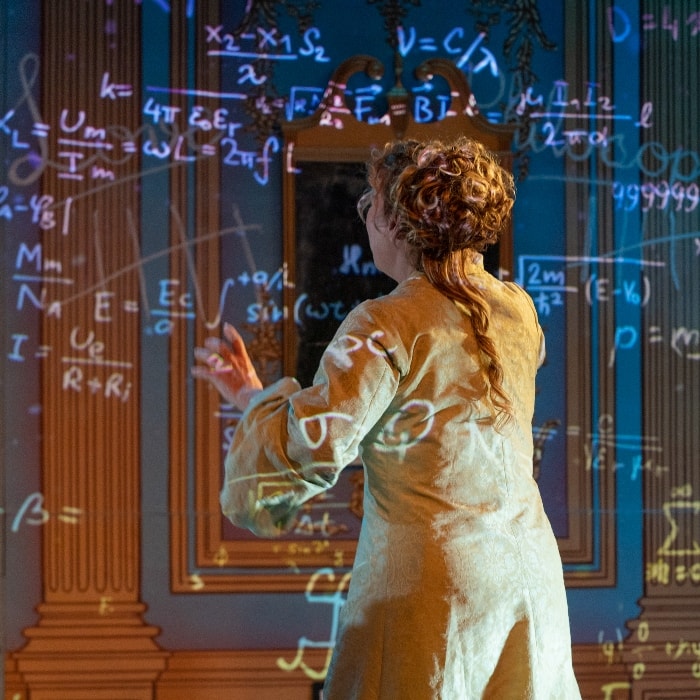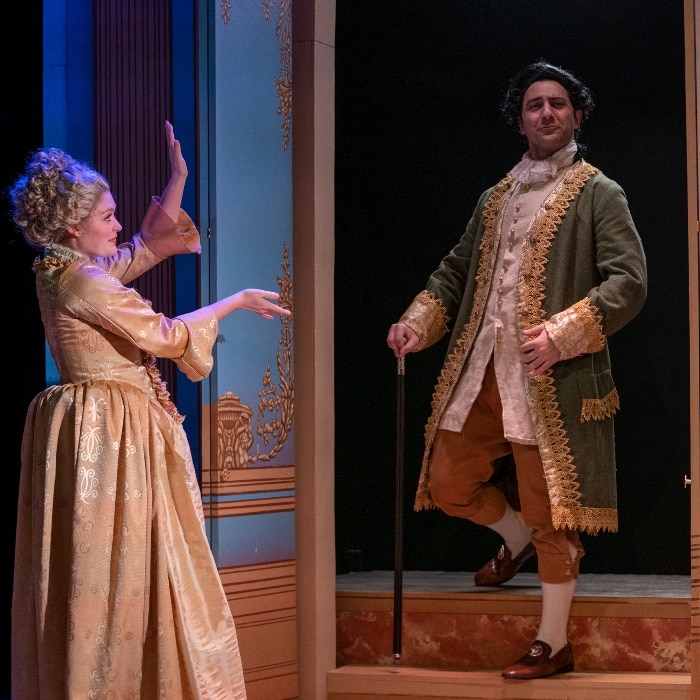Commissioned and premiered by Costa Mesa, CA’s South Coast Rep in 2009, Emilie: La Marquise du Châtelet Defends Her Life Tonight by Lauren Gunderson (America’s most produced playwright of 2022-23) is making its NYC debut this month with the female-led company Duende Productions, playing a limited engagement Off-Off-Broadway at The Flea. Directed by Kathy Gail MacGowan, the work combines science, metaphysics, and biography with drama and comedy in its examination of the life, loves, and contributions of 18th-century French physicist Emilie du Châtelet (1706-49), whose accomplishments had remained largely untold because of her gender and her longtime liaison with the more illustrious Enlightenment philosopher and writer Voltaire, which, until recently, had left her remembered merely as his mistress and collaborator.

Presented in the format of a memory play told from the post-mortem perspective of Emilie (who died at the age of 42, giving birth to the child of her last lover, the poet Jean François de Saint-Lambert), the dead woman introduces what each scene is about, recounts the key episodes, figures, and achievements in her life, keeps a running tally of her victories in love and philosophy, and laments that she needed more time to complete her trailblazing work, including her translation and commentary on Isaac Newton’s 1687 Principia (which was published posthumously in 1756, and still remains the standard French translation), disproving his laws of physics, advocating for Leibniz’s equation of kinetic energy, and laying the groundwork for Einstein’s theory of relativity. And in keeping with the show’s prominently displayed F = mv² – the scientific construct of vis viva or force vive (living force) promoted by Leibniz and Emilie – the deceased woman is unable to touch anyone in her reenacted story without setting off painful crackles of energy and a blackout, so she is represented on stage as both her posthumous entity and, when physical contact with other characters is needed, as her younger living self.
Along with all the intellectual discussions, scientific formulas, references to the leading physicists, philosophers, and writers of the time, and clever embodiments of Emilie’s theories, Gunderson’s well-researched and inventive play is filled with the libertine sexuality that characterized the upper class of the era (with women permitted the same freedom as men, as evinced in Emilie’s open marriage with her husband, relationship with Voltaire, and fatal pregnancy by her other lover – all three of whom are recorded in history as having been present at her deathbed). There are also humorous bits of physical comedy, based in the popular tradition and stock characters of commedia dell’arte, which originated in Italy, then spread throughout Europe in the 16th-18th centuries, and in Voltaire’s later French satire Candide (published anonymously in 1759), which parodied the metaphysical optimism of Leibniz (the German polymath over whom he and Emilie were at odds) – all consummately directed by MacGowan and executed to perfection by Duende’s outstanding cast of five.

Amy Michelle stars as the brilliant, educated, and industrious Emilie, driven by both her mind and her heart as she reflects on her life, loves, and pursuits. She shifts flawlessly from vocalizing her thoughts and feelings, interacting with the other characters, engaging the audience with direct eye contact and direct-address comments, explaining the equations and theories, and debating them with Voltaire. It’s a demanding performance that she makes seem effortless with her total command of the expository material and the emotions Emilie experiences and expresses. Nigel Gore turns in a stellar portrayal of Voltaire, who is charming and eloquent in his devotion, appreciation, and support of Emilie, but as adamant a proponent of Newton over Leibniz, despite the conflict it causes with her, as he is outspoken about the principles that could land him back in the Bastille, from which she saved him by inviting him to live with her in the chateau in Cirey. His timing is impeccable in both his vocal delivery and his funny falls and salacious mounts.

The rest of the actors appear in multiple roles, both major and minor. Erika Vetter as “Soubrette” (a stock female character, or an actress playing the role, of a coquettish, conceited, or coy young woman), is seen alternately as the living youthful Emilie, who fills in for her deceased self in go-back scenes that require touching; Emilie’s strong and determined daughter, who opposes the proper demeanor traditionally taught to women and the easy life of an arranged marriage to a prince, preferring to be educated like her mother; and Voltaire’s pert, silly, and giggly niece Mary-Louise, with whom he has an affair (a hilarious characterization that contributes to the show’s many laughs).
Rounding out the terrific cast are Bonnie Black as the older “Madame,” who captures the personalities of Emilie’s serious mother and the laughably wealthy and arrogant Mme. Graffigny, with telling speech patterns, facial expressions, and moves; and Zaven Ovian as the “Gentleman,” manifesting his distinctive characterizations of Emilie’s formal but accepting husband, poetic lover, and other incidental men, and his mastery of the physical comedy that punctuates the show.

A top-notch artistic design transports us to the era of the French Enlightenment, with lavish period-style costumes (in contrast with Emilie’s plain nightdress/delivery gown, in which she died) by Christina Beam; an efficient set by Sarah White that evokes the furnishings and architecture of the time, with a back wall that serves as a chalkboard for Emilie’s tally and equations and opens up to an adjoining space with steps; lighting by Sasha Lysenko that blacks out when the dead Emilie touches a companion; and musical compositions by Ian McNally that are in tune with the historical subject.
Whether you’re interested in learning more about an under-recognized woman’s contributions to physics, enjoy theatrical stylings inspired by the 18th century, or want to be entertained by a delightful and compelling cast, Emilie provides an illuminating and engaging evening that will have you laughing and leave you contemplating the force vive.
Running Time: Approximately one hour and 45 minutes, including an intermission.
Emilie: La Marquise du Châtelet Defends Her Life Tonight plays through Sunday, April 30, 2023, at The Flea, 20 Thomas Street, NYC. For tickets (priced at $40, plus fees), go online. Masks are not required.





